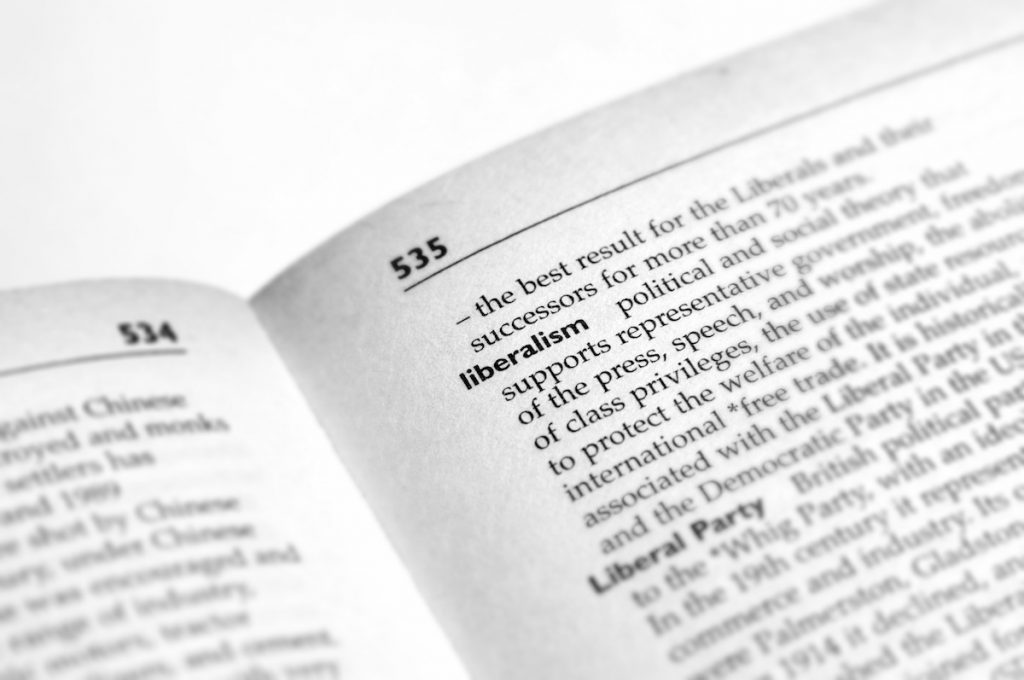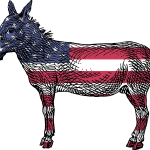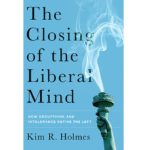This essay is part of a series on Liberalism. See the full collection here.
In “The Last Time I Saw Richard” Joni Mitchell sings that “all romantics meet the same fate someday / Cynical and drunk and boring someone in some dark café.” Mitchell’s line artfully captures the intimate relationship between romanticism and cynicism that Irving Babbitt so powerfully described and warned of in his underappreciated masterpiece Rousseau and Romanticism.
I can’t help thinking about Mitchell’s line as I observe the most recent outbreak of right-wing antiliberalism, as reflected in the writings of Patrick Deneen, Rod Dreher, Adrian Vermeule, Michael Hanby, and others. This new antiliberalism does not appear to be saying anything new, and I too run the risk here of repeating what has been already been said, often by writers of greater wisdom and wit than I possess. Public Discourse readers may recall the exchanges with Deneen about liberalism in these pages five years ago, in which I played some part.
In fact, most of Deneen’s arguments on the logic of liberalism can be found in the writings of Leo Strauss, especially Natural Right and History. But as Strauss himself pointed out, discontent with liberalism dates back to Jean-Jacques Rousseau in the eighteenth century. Scolding classical liberalism has been a popular sport of intellectuals ever since. But this is a dangerous game: It was Rousseau’s romantic attack on liberalism that paved the way for the totalitarian liberalism that threatens us today.
Start your day with Public Discourse
Sign up and get our daily essays sent straight to your inbox.The new antiliberals are not wrong to worry about the dire state of American politics and culture, or to warn against what I call the “Autonomy Industrial Complex,” the unholy alliance of expressive individualism, political power and corporate greed. In fact, both Deneen and Dreher contributed to a book I co-edited on Wendell Berry in 2011, in which I declared, like Deneen, that “ours is a culture against culture, an anti-culture, and the consequences have been a tragic disintegration and fragmentation of individuals and communities.”
It is precisely because threats from the new antiliberalism of the left are so grave that I feel the need to challenge my antiliberal friends on the right. Opponents of left-wing antiliberalism must avoid the temptation to romantic reactions against it, whose falsifying consolations we can ill afford. (See here for a useful summary of the difference between right-wing and left-wing antiliberalism.) The new antiliberals’ attack on liberalism and America contradicts the best instincts of conservatism. They persistently fail to adequately ask, much less clearly answer, three pressing questions that must be part of any adequate treatment of the problem, and they virtually ignore the thoughtful conservative alternatives to antiliberalism that do address these questions.
Question One: Are liberal institutions to blame for the current state of things, or is it the fault of “liberal” anthropology alone?
According to the new antiliberals, there is only one liberalism, and it is rooted in an anthropology of radical autonomy. As Deneen succinctly puts it in his First Things essay, “Unsustainable Liberalism,” “liberalism is constituted by a pair of . . . anthropological assumptions that give liberal institutions a particular orientation and cast: 1) anthropological individualism and the voluntarist conception of choice, and 2) human separation from and opposition to nature.”
This characterization of liberalism is tendentious. In the first place, it is silent about liberal institutions such as government by consent, the separation of powers, religious liberty, and freedom of speech. Thus, as Samuel Gregg nicely points out, the new antiliberal critique leaves systematically ambiguous whether those liberal institutions are also flawed, and whether those institutions can be salvaged and supported by a different anthropology. If the new antiliberals repudiate the basic institutions of liberalism, they should clearly say so.
In the second place, this characterization does not apply to most of the thinkers typically thought to be “liberal,” such as Immanuel Kant, Adam Smith, Montesquieu, James Madison, Alexander Hamilton, Thomas Jefferson, Alexis de Tocqueville, Lord Acton, Friedrich Hayek, and even, I dare say, the later John Rawls. None of these thinkers asserts radical autonomy to be the basis of liberalism.
Like Karl Marx, who interprets the history of social and political conflict through the unidimensional lens of his deterministic economic anthropology, so the new antiliberals interpret all of liberalism through the deterministic lens of radical autonomy. (Is it an accident that their description of liberalism bears striking resemblances to Marx’s account of the bourgeois in the first part of The Communist Manifesto?) Again like Marx, the new antiliberals know that lying beneath the surface of what self-identified liberals say and do is the anthropological mechanism that inexorably drives liberal regimes to their demise.
Instead of interpreting liberalism through an a priori ideological lens, isn’t it more reasonable and fair to pay attention to what self-described liberals say and do? After all, liberalism is not an independently existing thing that we can go out and study, the way biologists go out and study flora and fauna.
Here we have much to learn from the philosopher John Searle’s The Construction of Social Reality. One of Searle’s key observations is that although social reality is “ontologically subjective,” it is “epistemically objective.” Social reality is constituted by a “collective intentionality.” Just because human beings make social reality does not mean any individual human being can make social reality.
If we want to know what liberalism is, then, we have to pay attention to the “collective intentionality” of liberalism. What we discover is that liberalism is not a monolithic concept, but a “tradition of inquiry” (to use Alasdair MacIntyre’s term) that is embodied in concrete historical events, texts, institutions, and practices. That tradition involves at least four competing families: anarcho-capitalism, libertarianism, classical liberalism, and (generously) Modern Liberalism. (For the long argument, see my recent book; for a short argument, see my recent essay for Law and Liberty). These families give liberalism a wide semantic range.
What all liberalisms share in common is the principled limitation of political authority by non-political ends, typically beginning with religious liberty and extending to freedoms of speech, press, property, and other civil liberties. The families within liberalism differ on the exact scope of those limits, and on the philosophical foundations (conceptions of reason, nature, tradition, religion, etc.) by which they arrive at those limits. These philosophical differences do not merely reflect the very different paths of the Scottish, French, and German Enlightenments (another concept that is not monolithic), they also reflect different ways in which the Western philosophical tradition is appropriated.
These differences within liberalism are very important and consequential, providing a permanent task and challenge for citizens within liberal societies. Why permanent? Because “all governments rest on opinion,” as James Madison puts it in The Federalist. And “as long as the reason of man continues fallible, and he is at liberty to exercise it, different opinions will be formed.” Therefore, political liberty must be won anew by each generation through education, action, argument, and debate. To wish for an end to spirited disagreement within a political association is to wish for an end to politics. And both wishes, short of the eschaton, are utopian fantasies.
In sum, liberalism (and its attendant features, such as the free market, natural rights, and democracy) has a rich semantic range that is constituted by competing arguments about the nature of political justice. It has never been a monolithic philosophy or even a neatly deductive system. Many, if not most, of its core features were won from the ground up out of the particular stresses and strains of history, features that only later elicited justification in philosophical arguments.
Question Two: If the “liberal” anthropology is the cause of our current problems, are liberal institutions supportable by a different anthropology?
We are now in a position to see why the new antiliberals’ critique of liberalism is irresponsible. Given the wide semantic range of meanings available to them, the new antiliberals choose to reduce liberalism to its worst possible features. Recalling what was said above about social reality, it can be seen that this choice is not determined by any fact about liberalism itself. It is a political choice, which, if widely adopted, actually serves to reduce the meaning of liberalism to its worst possible features. And this reduction in turn severely circumscribes the capacity of opponents of Modern Liberalism within liberal societies to challenge and correct those abuses by appealing to countervailing resources within the liberal tradition. (Consider for example Christopher Wolfe’s Natural Law Liberalism, which I develop in my book).
But if the new antiliberals are committed to this strategy, it is incumbent upon them to suggest a feasible political alternative to liberalism. Here the new antiliberals are notoriously inadequate. (Robert Kraynak’s Christian Faith and Modern Democracy is a refreshing exception. Although, like the new antiliberals, he reads liberalism through the monolithic prism of radical autonomy, he proposes a “Christian Constitutionalism” that looks virtually identical to the principles of the American Founding.) It’s always easier to criticize than to construct. Contrary to appearances, Deneen’s and Dreher’s localism is not an alternative to liberalism. This is a category mistake. They rightly celebrate localist endeavors, but they refuse to defend the liberal institutions that make localism possible (and which, as the civil rights era makes clear, are sometimes necessary for preventing localism from degenerating into its own form of oppression).
Question Three: If liberal institutions can be supported by a different anthropology, isn’t there sufficient support for it in America’s best tradition?
Everything I have said in this essay applies a fortiori to the new antiliberals’ critique of America. They persistently describe America with the same kind of selective arguments and evidence that they use to describe liberalism. For the new antiliberals, America is Modern Liberalism.
It has become tedious to point out why this argument is even more tendentious than the argument about liberalism, that there is not a shred of evidence that a single American founder embraced an anthropology of radical autonomy. (See, for example, Thomas West’s most recent book on the American founding). Even Leo Strauss, a most cautious writer, was willing to claim that “the United States of America may be said to be the only country in the world which was founded in explicit opposition to Machiavellian principles.”
America is liberal, and American conservatism entails a defense of the liberal institutions on which it was founded. It is only the new antiliberals’ unwarranted ideological assumption that liberal institutions necessarily rest on an anthropology of radical autonomy that causes their revolutionary turn against America. They completely ignore the fact that the abuses they most lament—such as abortion on demand, legalized obscenity, and same-sex marriage—were imposed on America against strong democratic majorities and against an unequivocal constitutional tradition by Supreme Court justices who relied on novel and highly implausible constitutional justifications.
Like the disillusioned, romantic revolutionary Raphael Hythloday in Thomas More’s Utopia, whose cynical view of politics is fueled by his imagined “no place” (the meaning of “Utopia”), so the new antiliberals recommend abandoning ship in the storm because we cannot control the winds. But surely even a damaged ship is better than floundering in the sea in a storm. Isn’t the true conservative strategy to rediscover and revitalize the remnants that will keep the ship afloat? The new antiliberals don’t even offer a lifeboat.
Lessons from a Polish Pope
The new antiliberals are responding to grave problems. But unless and until they respond to these questions, it is difficult to know whether they are serious about addressing those problems, or are more interested in an aesthetic pessimism.
To the new antiliberals, I offer a model of responsible liberality towards liberalism: Pope John Paul II. The language of liberalism (natural rights, the free market, democracy, etc.) is unmistakable in John Paul II’s writings. (See especially his great encyclical Centesimus Annus). Having experienced firsthand the destructive consequences of the illiberal reactions to liberalism in his native Poland, first by National Socialism and then by Soviet Communism, John Paul II saw the great danger of becoming merely a scold of liberalism. Rather than repudiate liberalism, John Paul II sought to restore its proper anthropology, an anthropology that he discerned in the American founding. It is instructive to compare his remarks on America with those of the new antiliberals:
Reading the founding documents of the United States, one has to be impressed by the concept of freedom they enshrine: a freedom designed to enable people to fulfill their duties and responsibilities toward the family and toward the common good of the community. Their authors clearly understood that there could be no happiness without respect and support for the natural groupings through which people exist, develop, and seek the higher purposes of life in concert with others.
It would be wonderful if the new antiliberals, with their considerable intelligence and talent, would see what was clear to a Polish Pope and join their conservative friends in embracing the difficult responsibilities of statesmanship.














